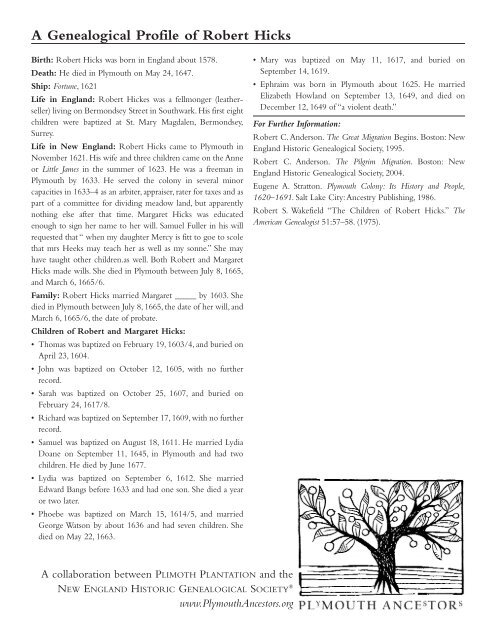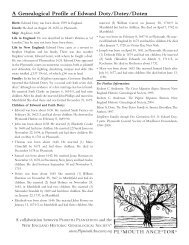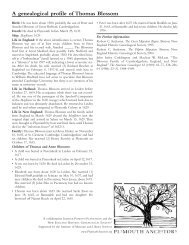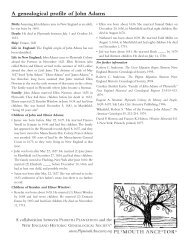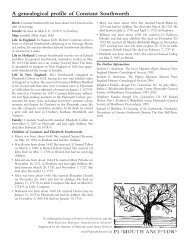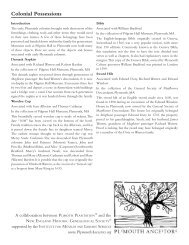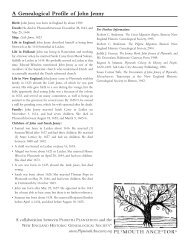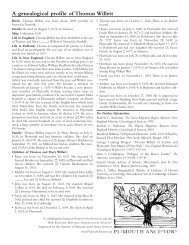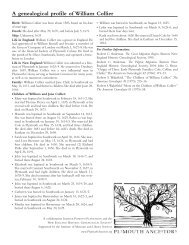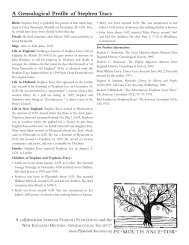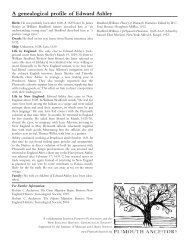Robert Hicks - Plimoth Plantation
Robert Hicks - Plimoth Plantation
Robert Hicks - Plimoth Plantation
Create successful ePaper yourself
Turn your PDF publications into a flip-book with our unique Google optimized e-Paper software.
A Genealogical Profile of <strong>Robert</strong> <strong>Hicks</strong><br />
Birth: <strong>Robert</strong> <strong>Hicks</strong> was born in England about 1578.<br />
Death: He died in Plymouth on May 24, 1647.<br />
Ship: Fortune, 1621<br />
Life in England: <strong>Robert</strong> Hickes was a fellmonger (leatherseller)<br />
living on Bermondsey Street in Southwark. His first eight<br />
children were baptized at St. Mary Magdalen, Bermondsey,<br />
Surrey.<br />
Life in New England: <strong>Robert</strong> <strong>Hicks</strong> came to Plymouth in<br />
November 1621. His wife and three children came on the Anne<br />
or Little James in the summer of 1623. He was a freeman in<br />
Plymouth by 1633. He served the colony in several minor<br />
capacities in 1633–4 as an arbiter, appraiser, rater for taxes and as<br />
part of a committee for dividing meadow land, but apparently<br />
nothing else after that time. Margaret <strong>Hicks</strong> was educated<br />
enough to sign her name to her will. Samuel Fuller in his will<br />
requested that “ when my daughter Mercy is fitt to goe to scole<br />
that mrs Heeks may teach her as well as my sonne.” She may<br />
have taught other children.as well. Both <strong>Robert</strong> and Margaret<br />
<strong>Hicks</strong> made wills. She died in Plymouth between July 8, 1665,<br />
and March 6, 1665/6.<br />
Family: <strong>Robert</strong> <strong>Hicks</strong> married Margaret _____ by 1603. She<br />
died in Plymouth between July 8, 1665, the date of her will, and<br />
March 6, 1665/6, the date of probate.<br />
Children of <strong>Robert</strong> and Margaret <strong>Hicks</strong>:<br />
Thomas was baptized on February 19, 1603/4, and buried on<br />
April 23, 1604.<br />
John was baptized on October 12, 1605, with no further<br />
record.<br />
Sarah was baptized on October 25, 1607, and buried on<br />
February 24, 1617/8.<br />
Richard was baptized on September 17, 1609, with no further<br />
record.<br />
Samuel was baptized on August 18, 1611. He married Lydia<br />
Doane on September 11, 1645, in Plymouth and had two<br />
children. He died by June 1677.<br />
Lydia was baptized on September 6, 1612. She married<br />
Edward Bangs before 1633 and had one son. She died a year<br />
or two later.<br />
Phoebe was baptized on March 15, 1614/5, and married<br />
George Watson by about 1636 and had seven children. She<br />
died on May 22, 1663.<br />
A collaboration between PLIMOTH PLANTATION and the<br />
NEW ENGLAND HISTORIC GENEALOGICAL SOCIETY ®<br />
www.PlymouthAncestors.org<br />
Mary was baptized on May 11, 1617, and buried on<br />
September 14, 1619.<br />
Ephraim was born in Plymouth about 1625. He married<br />
Elizabeth Howland on September 13, 1649, and died on<br />
December 12, 1649 of “a violent death.”<br />
For Further Information:<br />
<strong>Robert</strong> C. Anderson. The Great Migration Begins. Boston: New<br />
England Historic Genealogical Society, 1995.<br />
<strong>Robert</strong> C. Anderson. The Pilgrim Migration. Boston: New<br />
England Historic Genealogical Society, 2004.<br />
Eugene A. Stratton. Plymouth Colony: Its History and People,<br />
1620–1691. Salt Lake City:Ancestry Publishing, 1986.<br />
<strong>Robert</strong> S. Wakefield “The Children of <strong>Robert</strong> <strong>Hicks</strong>.” The<br />
American Genealogist 51:57–58. (1975).
Researching your family’s history can be a fun, rewarding, and occasionally<br />
frustrating project. Start with what you know by collecting information<br />
on your immediate family. Then, trace back through parents,<br />
grandparents, and beyond.This is a great opportunity to speak to relatives,<br />
gather family stories, arrange and identify old family photographs, and<br />
document family possessions that have been passed down from earlier<br />
generations.<br />
Once you have learned all you can from family members, you will<br />
begin to discover other sources. A wide variety of records can help you learn more about the lives of your ancestors.These<br />
include birth, marriage, and death records; immigration and naturalization records; land records; census records; probate records<br />
and wills; church and cemetery records; newspapers; passenger lists; military records; and much more.<br />
When you use information from any source — an original record, a printed book, or a website — always be careful to document<br />
it. If you use a book, you should cite the author or compiler, the full title, publication information and pages used.Also<br />
be sure to record the author’s sources for the information. If the author’s sources aren’t provided, you will have to try to find<br />
the original source. Many genealogical works contain faulty information, and the Internet also contains many inaccuracies. In<br />
order for your work to be accepted — by lineage societies and other genealogists — it must be properly documented.<br />
IMPORTANT GENEALOGICAL RESOURCES<br />
New England Historic Genealogical Society<br />
Founded in 1845, NEHGS is the country’s oldest and largest<br />
genealogical society.The library contains over 200,000 books,<br />
plus significant manuscript and microfilm collections, and a circulating<br />
library by mail. NEHGS members receive two periodicals,<br />
the Register and New England Ancestors, and can access<br />
valuable genealogical data online.<br />
NEHGS, 101 Newbury St., Boston, MA 02116;<br />
888-296-3447; www.NewEnglandAncestors.org.<br />
<strong>Plimoth</strong> <strong>Plantation</strong>: Bringing Your History To Life<br />
As a non-profit, educational organization our mission is: to offer<br />
the public powerful experiences of history, built upon thorough<br />
research of the Wampanoag and Pilgrim communities.We offer<br />
multiple learning opportunities to provide a deeper understanding<br />
of the relationship of historical events to modern America.<br />
Members have access to our Research Library.<br />
<strong>Plimoth</strong> <strong>Plantation</strong>, 137 Warren Avenue, Plymouth, MA 02632;<br />
508-746-1622; www.plimoth.org<br />
RECOMMENDED WEBSITES<br />
www.PlymouthAncestors.org<br />
www.CyndisList.com<br />
www.FamilySearch.org<br />
www.USGenWeb.org<br />
GENEALOGICAL LIBRARIES IN PLYMOUTH<br />
General Society of Mayflower Descendants Library<br />
A collection focused principally on the genealogies of the<br />
descendants of the Mayflower passengers.<br />
4 Winslow St., Plymouth; 508-746-3188; www.mayflower.org<br />
Plymouth Collection, Plymouth Public Library<br />
Over 1200 items relating to the descendants of the Pilgrims, as<br />
well as the many other immigrants who settled in the area.<br />
132 South St., Plymouth; 508-830-4250;<br />
www.plymouthpubliclibrary.org<br />
RECOMMENDED BOOKS<br />
The Complete Idiot’s Guide to Genealogy by Christine Rose and<br />
Kay Germain Ingalls,Alpha Books, 1997.<br />
Genealogist’s Handbook for New England Research by Marcia<br />
Melnyk, NEHGS, 1999.<br />
Shaking Your Family Tree:A Basic Guide to Tracing Your Family<br />
History by Ralph J. Crandall, NEHGS, 2001.<br />
Unpuzzling Your Past by Emily Croom, Betterway Books, 2003.<br />
A collaboration between PLIMOTH PLANTATION and the<br />
NEW ENGLAND HISTORIC GENEALOGICAL SOCIETY ®<br />
www.PlymouthAncestors.org


